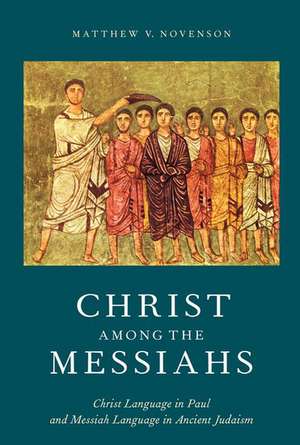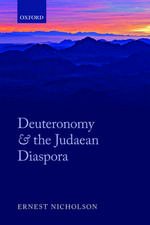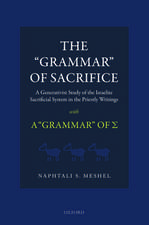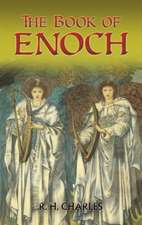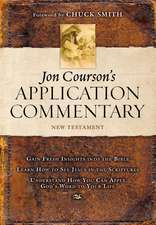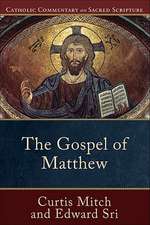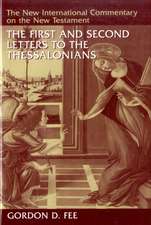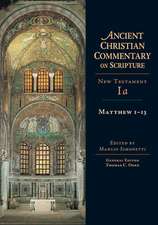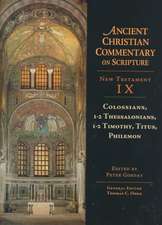Christ among the Messiahs: Christ Language in Paul and Messiah Language in Ancient Judaism
Autor Matthew V. Novensonen Limba Engleză Paperback – 29 oct 2015
| Toate formatele și edițiile | Preț | Express |
|---|---|---|
| Paperback (1) | 337.52 lei 31-38 zile | |
| Oxford University Press – 29 oct 2015 | 337.52 lei 31-38 zile | |
| Hardback (1) | 626.84 lei 31-38 zile | |
| Oxford University Press – 24 mai 2012 | 626.84 lei 31-38 zile |
Preț: 337.52 lei
Nou
Puncte Express: 506
Preț estimativ în valută:
64.59€ • 69.06$ • 53.85£
64.59€ • 69.06$ • 53.85£
Carte tipărită la comandă
Livrare economică 07-14 aprilie
Preluare comenzi: 021 569.72.76
Specificații
ISBN-13: 9780190274092
ISBN-10: 0190274093
Pagini: 256
Dimensiuni: 155 x 231 x 20 mm
Greutate: 0.45 kg
Editura: Oxford University Press
Colecția OUP USA
Locul publicării:New York, United States
ISBN-10: 0190274093
Pagini: 256
Dimensiuni: 155 x 231 x 20 mm
Greutate: 0.45 kg
Editura: Oxford University Press
Colecția OUP USA
Locul publicării:New York, United States
Recenzii
Novenson's argument in this volume appears to be focused, consistent, and overall convincing. His nuanced presentation on the messianic meaning of Paul's Christ language is commendable... I value Novenson's genuine contribution to our understanding of Paul's language.
Interpreters of Paul have traditionally understood christos in his letters as a mere proper name. Marshalling impressive resources of both classical and Jewish scholarship in this careful, shrewd and ground-breaking work, Matthew Novenson overturns this tradition, demonstrating that christos functioned for Paul as an 'honorific' with clear messianic meaning. This should precipitate a revolution not only in Pauline theology and exegesis but in our understanding of messianic ideas throughout second-temple Judaism."
Novenson argues convincingly that christos in Paul's letters means 'messiah,' with the term functioning as an honorific, much like Antiochus Epiphanes or Caesar Augustus. With its historically-rooted solution to the 'name-versus-title' debate, Novenson's study makes a significant contribution to the understanding of messiah language in Paul and in ancient Judaism. This book is a must-read for all interested in the historical and scriptural origins of Christian confession of Jesus as christos."
In this learned and lucid book, Novenson makes two important claims: when Paul said 'Christ' he meant 'messiah', and Paul's own language testifies to the varieties of messiah language in ancient Judaism. Novenson's arguments are compelling, and make a major contribution to the study of Paul and of ancient Judaism."
I expect his full-length study will contribute to overturning the scholarly consensus that Christos is an insignificant proper name in Paul's letters and will also open avenues for further research.
Christ among the Messiahs is a successful project that hopefully will spur many scholars to reconsider the possibility that Christos in Paul is a meaningful term. If they do, and I think they should, then we are likely to see a spate of new investigations into Paul’s messiah Christology and, more broadly, into the complexity of messianic language in ancient Judaism. Should that development bear fruit, we will have Novenson, among others, to thank for it.
Interpreters of Paul have traditionally understood christos in his letters as a mere proper name. Marshalling impressive resources of both classical and Jewish scholarship in this careful, shrewd and ground-breaking work, Matthew Novenson overturns this tradition, demonstrating that christos functioned for Paul as an 'honorific' with clear messianic meaning. This should precipitate a revolution not only in Pauline theology and exegesis but in our understanding of messianic ideas throughout second-temple Judaism."
Novenson argues convincingly that christos in Paul's letters means 'messiah,' with the term functioning as an honorific, much like Antiochus Epiphanes or Caesar Augustus. With its historically-rooted solution to the 'name-versus-title' debate, Novenson's study makes a significant contribution to the understanding of messiah language in Paul and in ancient Judaism. This book is a must-read for all interested in the historical and scriptural origins of Christian confession of Jesus as christos."
In this learned and lucid book, Novenson makes two important claims: when Paul said 'Christ' he meant 'messiah', and Paul's own language testifies to the varieties of messiah language in ancient Judaism. Novenson's arguments are compelling, and make a major contribution to the study of Paul and of ancient Judaism."
I expect his full-length study will contribute to overturning the scholarly consensus that Christos is an insignificant proper name in Paul's letters and will also open avenues for further research.
Christ among the Messiahs is a successful project that hopefully will spur many scholars to reconsider the possibility that Christos in Paul is a meaningful term. If they do, and I think they should, then we are likely to see a spate of new investigations into Paul’s messiah Christology and, more broadly, into the complexity of messianic language in ancient Judaism. Should that development bear fruit, we will have Novenson, among others, to thank for it.
Notă biografică
Matthew V. Novenson is Lecturer in New Testament and Christian Origins at the University of Edinburgh.
